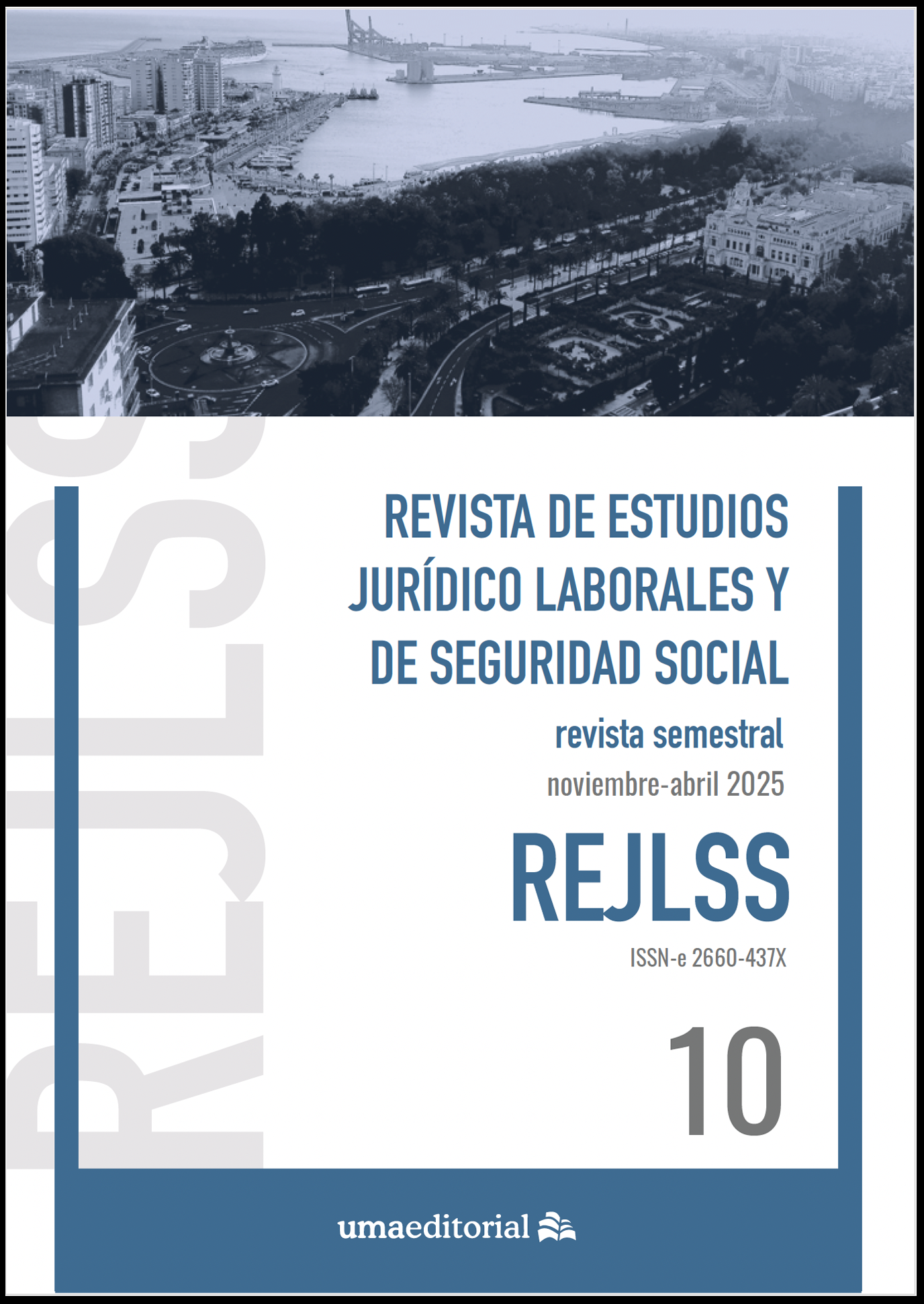A debate over the categorization (or not) of digital disconnection in the workplace as a fundamental right
DOI:
https://doi.org/10.24310/rejlss10202520771Keywords:
digital disconnection, directive, fundamental, regulation, computer fatigueAbstract
The article analyzes the issue of the right to digital disconnection in the work context, arguing that the Spanish courts do not consider it a fundamental right. Court cases are presented that support this position, highlighting that failure to comply with this right can lead to the termination of the employment contract, but not to additional compensation for moral damages as it is not a fundamental right under Spanish law. However, arguments are put forward in favor of considering the right to digital disconnection as fundamental. The relevance of national and international regulations that support this right is mentioned, such as the Charter of Fundamental Rights of the European Union and the International Covenant on Economic, Social and Cultural Rights. Furthermore, the community legislative initiative to guarantee this right at the European level is highlighted. In short, it is proposed that the debate on the fundamental nature of the right to digital disconnection continues, and it is expected that future judicial decisions (Supreme Court) may change this interpretation, especially considering its relationship with the health, dignity and privacy of Workers.
Downloads
Metrics
Publication Facts
Reviewer profiles N/A
Author statements
Indexed in
-
—
- Academic society
- N/A
- Publisher
- Universidad de Málaga. UMA Editorial
References
Alexy, R., Bernal Pulido, C. (Coord.), & Portocarrero Quispe, J. A. (Trad.), Teoría de los derechos fundamentales (3ª ed.), Centro de Estudios Políticos y Constitucionales, 2022.
López Insua, B.M., “Los derechos fundamentales de los empleados públicos en la era digital”, RIGL: Revista Iberoamericana de Gobierno Local, núm. 24, 2023.
Ministerio de Trabajo y Economía Social, “Gobierno y organizaciones sindicales firman el acuerdo para la reducción de la jornada semanal a 37,5 horas sin reducción salarial”, 20 de diciembre de 2024, [Nota de prensa], Recuperado de https://prensa.mites.gob.es/webPrensa/listado-noticia/noticia/4405
Molero Marañón, M. L., “El derecho a la desconexión digital en el marco de la Unión Europea con especial atención a la igualdad de género”, Revista de Derecho Laboral vLex (RDLV), núm. 4, 2021.
Pérez Luño, A.E., Los derechos fundamentales (9ª ed.), Tecnos, Madrid, 2007.
Tapia Trueba, A., “Pasado, presente y propuestas de futuro de la desconexión digital”, Revista Española de Derecho del Trabajo, núm. 258, 2022.
Trujillo Pons, F., “Un estudio acerca de la eventual Directiva comunitaria sobre el derecho a la desconexión digital en el trabajo”, IUSLabor, 2021.
Velasco Lozano, J., “Desconexión digital: Más allá de la (escasa) normativa española. Propuesta de directiva del Parlamento Europeo e instrucciones prácticas para el respeto de este derecho”, Revista de Derecho Laboral vLex (RDLV), núm. 2, 2021
Downloads
Published
How to Cite
Issue
Section
License
Copyright (c) 2025 Francisco Trujillo Pons

This work is licensed under a Creative Commons Attribution-NonCommercial-NoDerivatives 4.0 International License.
In the Revista de Estudios Juridico Laborales y de Seguridad Social (REJLSS) we are clearly committed to a policy of open access to scientific knowledge (See Berlin Declaration).
Those authors who have publications with this journal accept the following terms:
This journal provides immediate free access to its content under the principle of making research freely available to the public. All the contents published in the REJLSS are subject to the Creative Commons license
Attribution-NonCommercial-NoDerivatives 4.0 International (CC BY-NC-ND 4.0)
Copyrights are of two kinds: moral and patrimonial. Moral rights are perpetual, inalienable, non-transferable, inalienable, unattachable and imprescriptible prerogatives. In accordance with Spanish copyright legislation, the authors who publish in REJLSS retain the moral right over their work, as well as the ownership of the patrimonial right, which will be transferred to the University of Malaga for its dissemination in open access.
The patrimonial rights, refer to the benefits that are obtained by the use or disclosure of the works. REJLSS is published in open access and is exclusively authorized to perform or authorize by any means the use, distribution, dissemination, reproduction, adaptation, translation or transformation of the work.
It is the responsibility of the authors to obtain the necessary permissions of the images that are subject to copyright.
Authors whose contributions are accepted for publication in this journal retain the non-exclusive right to use their contributions for academic, research and educational purposes, including self-archiving or depositing in open access repositories of any kind.
The electronic edition of this magazine is edited by the Editorial of the University of Malaga (UmaEditorial), being necessary to cite the origin in any partial or total reproduction.
The authors may adopt other non-exclusive license agreements for the distribution of the version of the published work (eg: deposit it in an institutional telematic archive or publish it in a monographic volume) provided that the initial publication is indicated in this magazine.
Authors are allowed and recommended to disseminate their work through the Internet (eg, in institutional telematic archives or on their website) before and during the submission process, which can produce interesting exchanges and increase citations of the published work.







19.png)
